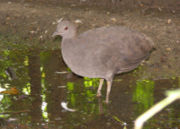
Cinereous
Encyclopedia

Copper (color)
Copper is a reddish brown color that resembles the metal copper.At right is displayed the color copper.The first recorded use of copper as a color name in English was in 1594.-Pale copper:...
brown
Brown
Brown is a color term, denoting a range of composite colors produced by a mixture of orange, red, rose, or yellow with black or gray. The term is from Old English brún, in origin for any dusky or dark shade of color....
. It is derived from the Latin
Latin
Latin is an Italic language originally spoken in Latium and Ancient Rome. It, along with most European languages, is a descendant of the ancient Proto-Indo-European language. Although it is considered a dead language, a number of scholars and members of the Christian clergy speak it fluently, and...
cinereous, from cinis (ashes).
The first recorded use of cinereous as a colour name in English
English language
English is a West Germanic language that arose in the Anglo-Saxon kingdoms of England and spread into what was to become south-east Scotland under the influence of the Anglian medieval kingdom of Northumbria...
was in 1661.
Cinereous in nature
BirdBird
Birds are feathered, winged, bipedal, endothermic , egg-laying, vertebrate animals. Around 10,000 living species and 188 families makes them the most speciose class of tetrapod vertebrates. They inhabit ecosystems across the globe, from the Arctic to the Antarctic. Extant birds range in size from...
s
- The colour name cinereous is used especially in the names of birds with ash grey plumage, including the Cinereous AntshrikeCinereous AntshrikeThe Cinereous Antshrike is a species of bird in the Thamnophilidae family. The term cinereous describes its colouration. It is found in Bolivia, Brazil, Colombia, Ecuador, French Guiana, Guyana, Peru, Suriname, and Venezuela. Its natural habitat is subtropical or tropical moist lowland...
(Thamnomanes caesius), Cinereous BecardCinereous BecardThe Cinereous Becard is a species of bird in the Tityridae family. The term cinereous describes its colouration...
(Pachyramphus rufus), Cinereous BuntingCinereous BuntingThe Cinereous Bunting, Emberiza cineracea, is a bird in the bunting family Emberizidae, a passerine family now separated by most modern authors from the finches Fringillidae. This species was discovered by Hugh Edwin Strickland.- Range :...
(Emberiza cineracea), Cinereous ConebillCinereous ConebillThe Cinereous Conebill is a species of bird in the Thraupidae family. The term cinereous describes its colouration. It is found in Bolivia, Chile, Colombia, Ecuador, and Peru...
(Conirostrum cinereum), Cinereous FinchCinereous FinchPiezorhina is a genus of finch-like tanager. The term cinereous describes its colouration. It contains a single species, the Cinereous Finch . It is found in arid coastal northern Peru, with a single record, presumably an straying bird, from immediately adjacent Ecuador....
(Piezorhina cinerea), Cinereous Ground-tyrantCinereous Ground-tyrantThe Cinereous Ground-tyrant is a species of bird in the Tyrannidae family. The term cinereous describes its colouration. It is found in Argentina, Bolivia, Chile, and Peru. Its natural habitat is subtropical or tropical high-altitude grassland.- References :* BirdLife International 2004. . ...
(Muscisaxicola cinereus), Cinereous HarrierCinereous HarrierThe Cinereous Harrier is a South American bird of prey of the harrier family. Its breeding range extends from the Tierra del Fuego through Argentina and Chile to Bolivia, Paraguay and southern Brasil; and across the Andes north to Colombia.The term cinereous describes its colouration...
(Circus cinereus), Cinereous MournerCinereous MournerThe Cinereous Mourner is a species of bird in the Tityridae family. The term cinereous describes its colouration. It has traditionally been placed in the cotinga family, but evidence strongly suggest it is better placed in Tityridae, where now placed by SACC...
(Laniocera hypopyrra), Cinereous-breasted SpinetailCinereous-breasted SpinetailThe Cinereous-breasted Spinetail is a species of bird in the Furnariidae family. The term cinereous describes its colouration. It is found in Bolivia, Brazil, and Peru. Its natural habitats are subtropical or tropical seasonally wet or flooded lowland grassland and heavily degraded former...
(Synallaxis hypospodia), Cinereous TinamouCinereous TinamouThe Cinereous Tinamou Crypturellus cinereus is a type of ground bird found in swamp and lowland forests in northern South America. Cinereous Tinamou’s have been around for many centuries. They are part of the oldest families of the world today, and have fossils discovered dating back tens of...
(Crypturellus cinereus), Cinereous TyrantCinereous TyrantThe Cinereous Tyrant is a species of bird in the Tyrannidae family. The term cinereous describes its colouration. It is found in Argentina, Bolivia, Brazil, and Paraguay. Its natural habitat is subtropical or tropical dry shrubland.-References:* BirdLife International 2004. . Downloaded on...
(Knipolegus striaticeps), Cinereous Vulture (Aegypius monachus), and Cinereous Warbling-finchCinereous Warbling-finchThe Cinereous Warbling-finch is a species of bird in the Thraupidae family. It is endemic to Brazil. The term cinereous describes its colouration. Its natural habitat is subtropical or tropical dry lowland grassland. It is threatened by habitat loss.-References:* BirdLife International 2004. . ...
(Poospiza cinerea).
- However, the colours of these birds may be brighter to the birds themselves since birds are tetrachromatTetrachromatTetrachromacy is the condition of possessing four independent channels for conveying color information, or possessing four different types of cone cells in the eye...
s and can see colours in the ultravioletUltravioletUltraviolet light is electromagnetic radiation with a wavelength shorter than that of visible light, but longer than X-rays, in the range 10 nm to 400 nm, and energies from 3 eV to 124 eV...
range that are invisible to humans, who are trichromatTrichromatTrichromacy or trichromaticism is the condition of possessing three independent channels for conveying color information, derived from the three different cone types...
s.

